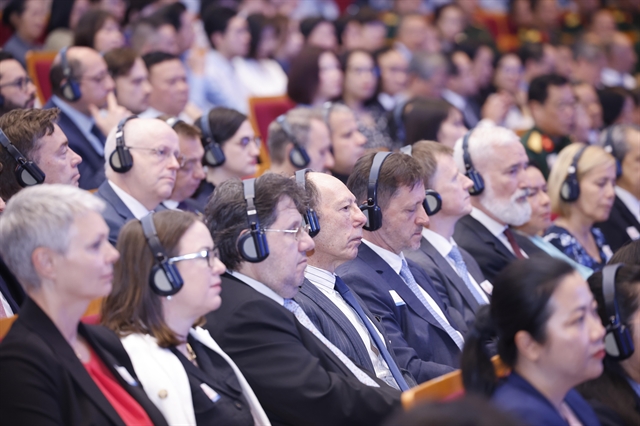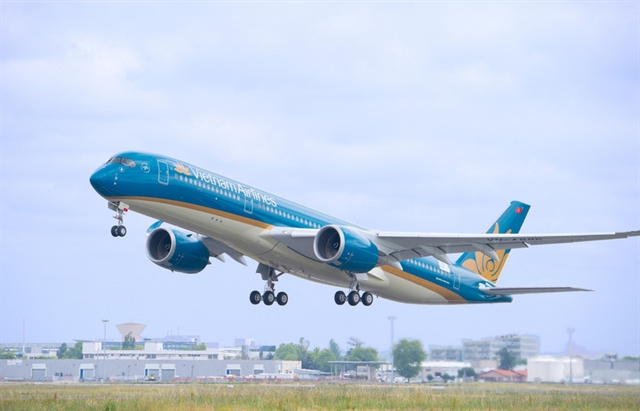 Politics & Law
Politics & Law

 |
| President Lương Cường delivers his speech at an international conference titled '50 Years of National Reunification: The Peacebuilding Role of Diplomacy from Past to Present' on Wednesday morning in Hà Nội.—VNA/VNS Photo Lâm Khánh |
HÀ NỘI — Việt Nam’s diplomatic efforts played a vital and far-reaching role in the historic victory of April 30, 1975. Half a century may have passed, yet the profound historical significance and enduring lessons of the victory remain deeply relevant to Việt Nam’s foreign policy, especially in shaping peace and building the nation.
President Lương Cường made this statement on Wednesday morning during an international conference in Hà Nội titled '50 Years of National Reunification: The Peacebuilding Role of Diplomacy from Past to Present'. The conference was held by the Ministry of Foreign Affairs.
Cường said that every country, regardless of size, experiences critical junctures that determine its fate and direction.
"For Việt Nam, the complete liberation of the South on April 30, 1975, marked an extraordinary milestone in its history.
“The nation was reunified and from that moment, Việt Nam embarked on a new era -- an era of independence, unity and the pursuit of socialism,” he said.
He also said that looking back at the history of the Vietnamese people's struggle for national liberation, independence and reunification, we are more clearly aware of the crucial role of diplomacy.
Following the declaration of independence in 1945, President Hồ Chí Minh sent numerous messages and letters to heads of State and foreign ministers in the United States, China, the Soviet Union and the United Nations, expressing Việt Nam’s readiness to "be a friend to all democratic nations and hold enmity towards none."
After nine long years resisting French colonial rule, Việt Nam, still impoverished and war-ravaged, was forced into a further battle against American imperialism.
Once again, the Vietnamese people's patriotism, resilience and unyielding determination, inspired by the creed 'Nothing is more precious than independence and freedom', came to the fore.
Recognising the asymmetric nature of the conflict, the Party and State of Việt Nam determined early on the need for a synchronised strategy across military, political and diplomatic fronts.
The Politburo’s 1969 resolution decided that diplomacy would become a vital strategic front. From then on, diplomacy was used as a powerful instrument to undermine enemy resolve, garner international support, and broadcast the legitimacy of Việt Nam’s cause to the global community.
Cường also confirmed that Việt Nam’s peacebuilding diplomacy has been a constant thread through various historical phases, from wartime liberation and national reunification to reconstruction and development in peacetime.
First, diplomacy mobilised extraordinary material and moral support from socialist nations and progressive peoples across the world.
Through the masterful diplomatic initiatives of President Hồ Chí Minh and other Vietnamese leaders, Việt Nam received heartfelt and principled assistance from the Soviet Union, China, Laos, Cambodia and other socialist countries.
Millions around the world, including figures such as Cuban leader Fidel Castro and Swedish Prime Minister Olof Palme, as well as American citizens, joined anti-war movements in solidarity with Việt Nam.
 |
| Participants at the conference on international diplomacy. —VNA/VNS Photo Lâm Khánh |
Second, diplomacy was implemented in close coordination with military and political efforts, leading to a strategy of “fighting while negotiating”, Cường said.
That paved the way for phased victories and, ultimately, the complete reunification of Việt Nam.
Key triumphs, notably the 1972 'Hà Nội – Điện Biên Phủ in the air' campaign, forced the United States to sign the 1973 Paris Peace Accords.
Fierce negotiations at the 1954 Geneva Conference and the Paris talks from 1968 to 1973 led by Vietnamese politicians and diplomats, including Phạm Văn Đồng, Lê Đức Thọ, Nguyễn Thị Bình, Nguyễn Duy Trinh and Xuân Thủy, cemented Việt Nam’s diplomatic reputation and demonstrated both resilience and intellect.
Third, diplomacy played a critical role in post-war reconstruction and the success of Việt Nam’s Đổi Mới (Renewal) policy.
Even during the final stages of the war, President Hồ Chí Minh expressed a vision of reconciliation, famously saying, “We are willing to lay out a red carpet and scatter flowers for the Americans to withdraw.”
Việt Nam’s humane treatment of American prisoners of war, the repatriation efforts following the Paris Peace Accords and cooperation in locating missing US personnel, all reflected Việt Nam’s goodwill and laid the groundwork for the restoration of bilateral relations.
Later, American veterans of the war, including US Senators John McCain and John Kerry, became key advocates for the normalisation of US–Việt Nam relations.
Over four decades of Renewal, Vietnamese diplomacy has contributed significantly to the nation’s historic achievements. From a country devastated by war, Việt Nam has risen to become one of the world’s top 35 economies by GDP and among the top 20 in global trade.
From diplomatic isolation, Việt Nam now maintains relations with 194 countries, including 34 comprehensive or higher-level partnerships. These include all permanent members of the UN Security Council, the entire G7 group and 18 of the G20 economies, along with all ASEAN nations.
Cường emphasised that half a century on, the struggle for independence and national reunification continues to offer invaluable lessons for diplomacy.
These include the creative application of Hồ Chí Minh’s diplomatic philosophy; the importance of independence, self-reliance and combining national strength with international solidarity; and the principle of 'firm in objectives, flexible in strategies and tactics'.
He also underlined the need for synergy between foreign policy and national defence, security, economic development and other key domains.
The president also reiterated the pivotal role of the overseas Vietnamese community as an inseparable part of the nation.
“For international friends, the historic victory of April 30, 1975 and the strong revival and development of Việt Nam are typical examples of a resilient, indomitable, peace-loving, friendly and humane nation,” he said.
Cường said he hopes the international conference will help further clarify the factors and lessons behind Việt Nam’s diplomatic achievements, particularly during the country’s liberation, reunification and development.
He also called for new ideas to enable Việt Nam to collaborate with the international community in fostering lasting peace in the region and beyond.
In his opening address at the conference, Deputy Prime Minister and Minister of Foreign Affairs Bùi Thanh Sơn said the 1975 victory of the Hồ Chí Minh Campaign ended a prolonged resistance war, liberating the South and reuniting the country.
It marked the beginning of a new era - with independence, unity, peace and development - for Việt Nam.
“The victory reflected the Vietnamese people’s patriotism, national unity and the burning aspiration for peace, shared by peace-loving people around the world,” Sơn said.
Reviewing Việt Nam’s diplomatic achievements over the decades, Sơn added that in today’s ever-changing world, Vietnamese diplomacy is undergoing a profound transformation and stepping into a new era of national resurgence.
Drawing from past lessons, Việt Nam is now actively contributing to a fair and rules-based international order, enhancing its global role in maintaining peace and security. — VNS




